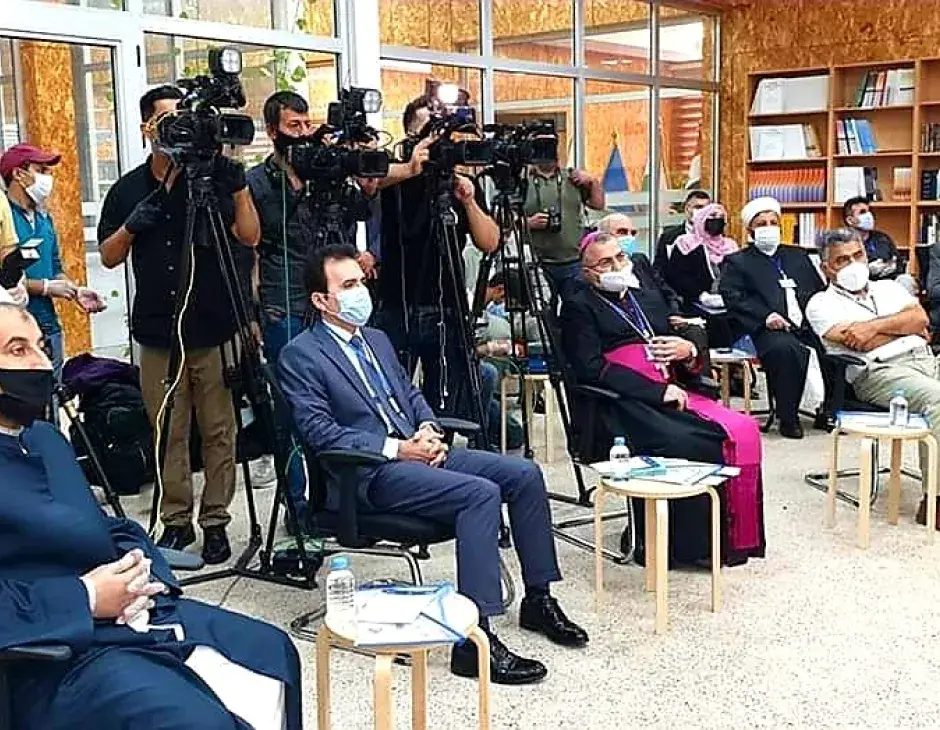COVID-19 Highlights the Need for the Active Involvement of Religious Leaders and Institutions
The author, Salah Ali, is the General Coordinator for the Iraq Religious Freedom Roundtable (IRFR), which fosters dialogue sessions and consultations on the protection of religious freedom. He holds an MA in Peace Development and is a PhD Candidate in Politics and International Relations. Recently Ali participated in a KAICIID-supported joint initiative with some of Iraq's key ministiries and religious institutions to provide pandemic awareness and relief. He reflects on the need for increased interfaith action as well as best practices for religious leaders to provide aid in their local communities.
As Iraq has responded to the complex challenges brought on by the COVID-19 pandemic it has provided yet another example of how religious institutions and religious leaders can play a vital role in society.
Religious leaders and religious institutions, particularly in the Middle East, have potential for significant influence in their societies. Understanding the role of religious leaders and institutions in the midst of the pandemic and associated economic and social challenges was the primary objective of “Encountering the Coronavirus (COVID-19) Pandemic with the Support of Religious Leaders,” a recent initiative supported by KAICIID in collaboration with the Iraqi Kurdistan Region’s Ministry of Endowments and Religious Affairs, the Ministry of Health, the Catholic University in Erbil-Iraq and religious leaders from various religious backgrounds (Baha’is, Christian, Mandaeans, Muslims and Yazidis).
"As a group of religious leaders, we gathered today with a purpose and that is to protect the human race,” one participant said.
In a workshop held on July 7, at the Catholic University in Erbil, leaders from various faiths came together to share best practices for how they had worked within their own community to respond to the challenges of the pandemic. These included highlighting practical steps such as best practices for hygiene and public health concerns. It also included ways to modify or suspend certain aspects of communal worship for a time to mitigate the spread of the virus.
An important theme of the conversation was that religious communities have a role to play not only within their community, but in engaging and serving those outside their own community, particularly in regard to the marginalised and vulnerable.
In challenging times, whether during conflict or a health crisis, religious leaders can play a vital role as figures who contribute to the good of society. Religious teachings can be utilised through these key players to ensure that the humanitarian and other efforts related to peacebuilding in the region have a greater effect. Furthermore, they can play essential roles in other fields, including the promotion of women’s rights, advocacy for the rule of law and the eradication of extremism.
“Religious actors are a stable force in their communities. They do not come and go when conflict arises, and they stay in touch with their communities even in times of displacement. This makes them more consistent forces in their communities than most other kinds of elites, like economic elites or politicians. This contributes to the strong sense of legitimacy that many possess in their communities,” said Ann Wainscott, author of recent USIP report that focused on understanding the religious landscape in post-ISIS Iraq.

Yet, there is also potential for manipulating or instrumentalising religious teachings by religious leaders to mobilise the public for political ends or to enflame sectarian divisions that contribute to conflict and violence.
Religious leaders and religious institutions could play either role. They can act as good or bad actors that can influence the wider society.
The “Encountering the Coronavirus (COVID-19) Pandemic with the Support of Religious Leaders” initiative was aimed at increasing the collaboration between religious leaders and community to inspire collective action.
This requires the courage to first, call for collective interfaith action, particularly in a country where religious diversity has frequently led to marginalisation and conflict. Collective interfaith action often not only yields better results but also strengthens social cohesion and encourages people to pursue other collective activities such as business, sport and the arts. Second, the government has a role to play in promoting an environment that encourages local and national governments, NGOs and faith based institutions to collaboratively implement projects that address peoples’ needs.
While the challenges facing Iraqi society are extensive, now is a critical time to transform the role of religious leaders and the religious institutions to enable them to be more involved in humanitarian activities and play an active role in supporting the tangible needs of society.

